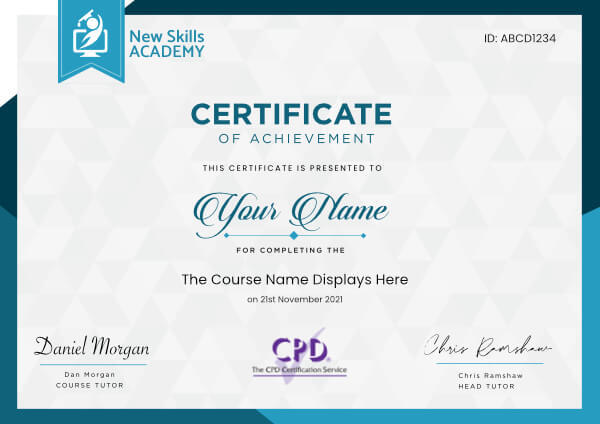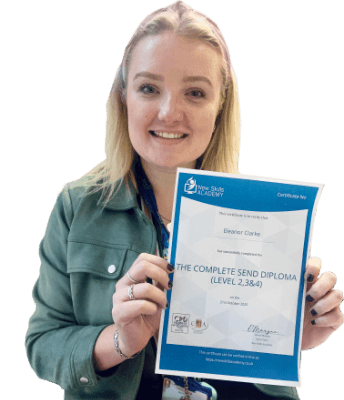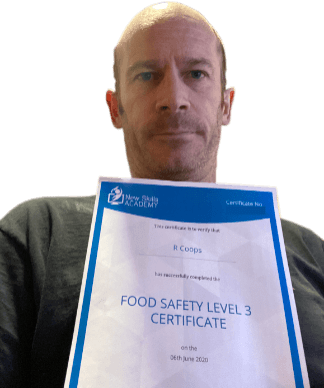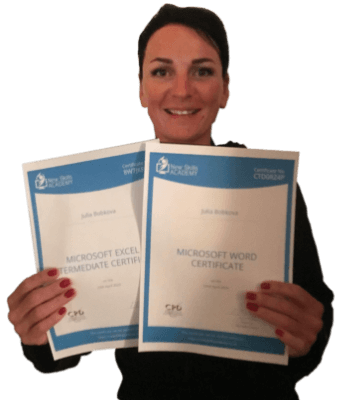Garden Design & Maintenance Certification
Do you have a love for nurturing the great outdoors, are you a green-fingered gardener? Have you ever thought about obtaining a garden design certification?
With this course you could become a qualified gardener just like thousands of other people have with our courses. For a one-off fee you can study online and complete the certification in about 15 hours. The comprehensive syllabus is supported by experienced tutors who are there to help you through email.
With 29 modules to cover, you can learn everything from 'how to build a pond' to 'plant selection and care'. Your qualification will be recognized and can be checked for validity by all of your future clients too!
Take a step in the right direction and get your Garden Design Certification today.
Garden Design and Maintenance Certification
Whether you are thinking of starting a career outdoors as a gardening expert or you are already working in the industry and are thinking of starting your own garden company, then the Garden Design and Maintenance Certification is the right choice for you.
Introduction to the Garden Design and Maintenance Certification
This information-packed course will teach you the basics you need to start your own gardening company or boost your career within the gardening industry. You can turn your hobby into a successful business by completing the twenty nine modules and passing the multiple choice question test.
The 29 modules cover everything from basic gardening to pest control, landscaping and more. The course takes approximately fifteen hours to complete and, on successful completion, you will have the ability to download and print your industry recognized certification.
When applying for a position within the gardening industry, your potential employer will be able to confirm your certification online. During your studies you will enjoy the convenience of studying at your own pace with no set schedule and from anywhere using any device, as long as you have a connection to the internet to access the modules.
What You Will Learn
The twenty nine modules included in this Garden Design and Maintenance certification are brimming with information to help you jump start your gardening career and turn your hobby and passion into a money-making opportunity.
- Learn the basics of gardening from the various soil types to plant planning and purchasing.
- Identify an effective garden planning process from the initial consultation with the client through to site surveys, maintenance planning, to the final and completed project.
- Learn about different garden design styles. Learn how to gain inspiration throughout the day, how to design a mood board and how to implement your design effectively for the best results.
- Understand site surveys, approvals and measuring techniques. Learn how to use survey maps, photographic records and what surveys and appraisals you are going to need before you begin.
- Learn the benefits of project planning.
- Know the five forms that should be included in all your client packs.
- Learn more about drawing a plan and essential graphic skills.
- Know the various surfaces and materials, understand what hard landscaping is and how to deal with it.
- Know the secrets of great soil.
- Understand the importance of the right plant selection and care. This includes use of colors to make an impact.
- Gain valuable plant knowledge that you can use daily to make the best choices based on your design, garden location and finish.
- Learn how to identify high maintenance areas within any garden. Know the different options when it comes to low maintenance planning.
- Learn the importance of sustainability. Know what plants to use, about water conservation and how to recycle and reuse when working in any garden.
- Learn essential tips for reducing maintenance in difficult to manage and overgrown gardens.
- Know what equipment you are going to need, what equipment you will need for certain jobs and what each item is capable of.
- Get a good understanding of the most common garden pests, natural and chemical pesticides, integrated pest management and how to come up with a pest management plan that will work.
- Identify effective solutions for difficult gardens from adding container plants to adding additional irrigation and more.
- Know what to plan in a herb and vegetable garden.
- Know what you need to start your own gardening business to achieve success.
- Learn more about marketing your business, health and safety in the workplace, insurance, tax and record keeping.
- Gain valuable insight into raising flower beds, laying patios, decking, fencing, know more about artificial grass, how to lay lawn and how to build a fish pond.
Benefits of the Garden Design and Maintenance Certification
This course is designed to provide you with a wide range of benefits, including:
- An easy to understand syllabus that you can learn at home and in your own time.
- Improve your career prospects with an industry recognized certification.
- Learn using any device at any time.
- Enjoy ongoing support during your studies.
This course includes
24/7 Student Support
End of course certification
Lifetime access to your course
Compatible with modern devices
- Soil type, soil evaluation & soil improvement: learn about the different types of natural soil and additional plant mixers which can be used to stimulate plant growth.
- Garden planning & preparation: Understand the importance of initial planning on paper, before beginning the practical aspects of gardening.
- Plant planning & purchase tips: Determine plant types and their uses, discover plant purchasing techniques.
- Maintenance-Soil Nourishment & Watering: Learn the different materials essential for the nourishment of soil to facilitate growing and maintenance of healthy plants.
- To discover the importance of the initial consultation, ongoing discussions, clarity and onsite analysis.
- To understand the necessity of site surveying and garden concept plans to aid the decision- making process and avoid potential mishaps.
- The basic elements of good garden design, including the plant options, hardscapes, texture and color elements.
- To become aware of the process in reaching the master garden plan stage and incorporating further elements into during the implementation stage.
- The importance of gathering inspiration daily from all avenues of your life, nature, other gardens, books, online and your creative inspiration.
- An expansive list of garden design possibilities and the insight that there can be one singular theme, a combination of two or more or an adapted version of any.
- How creating a garden design mood board assists both the owner and garden designer in creating a visual effect of the ideas, colours, plants and preferred overall theme, which can be incorporated into the garden space and features available.
- How to use a virtual mood board created from an array of images.
- Materials and areas of measurements required for surveying a site for garden design
- The various measurement techniques used for accurately measuring the different aspects required for completing a site survey, including curved and irregular areas
- Various scales used in recording site measurements on survey maps
- Correct photographic recordings and survey map drawing requirements
- Learn the benefits of project planning regardless of the size of project
- Become knowledgeable in the stages of project planning
- Discover the importance of creating timelines, chronological action step lists and available resources
- Learn about developing preliminary plans and baseline plans when planning a garden project
- Discover ways to incorporate and create optical illusion methods to enhance small garden spaces so they appear larger than life, such as creating focal points and distractions
- You will learn many techniques including the use of long lines and garden division methods
- The effective use of space to create a garden that suits all tastes and preferences
- Learn about narrow plant varieties, shelf layering and creating a portable garden to suit small gardens
- You will learn how time spent with creative experimentation on paper can result in saving a lot of timely and costly delays and allow for the optimal garden creation for each space
- You will learn how to draw a garden plan which offers beauty and practicality once you have carried out a site survey and consultation
- You will discover how to create a scale for your garden plan that allows ease of following and minimize mistakes
- You will know how to create a graphic from your garden plan to show best visual representation for the proposed changes and design options
- The different considerations you should make before deciding which garden surface materials to choose for each landscape for effective style and functionality.
- The different hard landscaping options, which can be used for varying garden requirements and preferences from solid garden flooring options like stone and concrete to softer, uneven options such as glass beadings or pebbles.
- The advantages and uses of combining two or more hard surface options within one garden such as cost, functionality and style.
- How to be familiar with the creative use of hard landscaping materials that are used to turn dull spaces into stunning visual displays and create functional but attractive garden areas.
- Learn the composition of the various soil types including their textures and unique components.
- Learn the advantages and disadvantages of the different types of soil and what can be done to enhance each for increased fertility.
- Discover the types of plants that are best suited to each soil type: sandy, chalky, clay, peat, silt and loam.
- Discover the secrets of creating great soil by use of organic, natural materials.
- Learn the advantages of planting native species to enhance your garden and surrounding wildlife species
- Learn how to best use space constraints and other factors to adhere to when planning the spatial aspects of plant life.
- Learn about color themes and the color wheel so that the garden plants, shrubs and trees chosen complement the existing background and client preferences.
- Learn about the effect of sunlight and climate features in relation to plant selection.
- Understand plant reproductive systems: Asexual and sexual reproduction, plus a little plant physiology.
- Receive a brief introduction to plant classification for a beginning to what plants to use.
- Learn what plants work well in different gardens and the importance of matching certain plants together.
- Learn about exotic and tropical plants, the care they need and how to grow them in temperate climates.
- How to identify high maintenance areas in an existing garden
- The different types of low maintenance gardens
- How to use gravel, soil, and turf to make the garden maintenance lower
- How planting few varieties, but more in number is a solution
- Why creating a garden with plants that are maintainable is important
- Why edible plants are sustainable
- Going native with plants for sustainability
- Reusing and Recycling Materials in the Garden
- How to reduce maintenance if it is getting out of control
- Pruning and deadheading for appropriate care of plants
- How to perform natural pest control
- Winterisation in a temperate climate is an essential part of owning a garden
- What equipment you will need to run a garden design & maintenance service
- How to choose the right tools for each job
- What each piece of equipment is capable of
- About racks & stakes for vine plants
- How to define and identify common gardening pests
- The difference between natural and chemical pesticides
- How to garden based on the pests in your garden
- How to monitor the pests in your garden to determine if a treatment plan is working
- About adding container plants to keep the plants owners love without possible difficulties
- How changing irrigation and watering systems can make a difficult garden easier to manage
- About adding new plants with an eye towards low maintenance or new landscaping for easier gardens
- How sometime starting over is the best option
- What to plant
- How to plant vegetable and herb gardens
- How to fertilize the garden
- About canning
- About tailoring your services to meet the needs of groups of customers
- How to build a website presence
- How to price your service
- Why customer service is essential
- About website business marketing
- About marketing and social media for a bricks and mortar company
- Why networking is still important
- About advertising costs
- Health and safety laws, including OSHA guidelines
- The responsibilities of an employer, employee and safety officer
- The risks involved in gardening
- The employee training requirements
- An overview of the types of insurance required
- The income business tax structure
- Record keeping and software: you will need to have detailed records for taxes, which is made easier by software
- Benefits of hiring an accountant
- Benefits of raised beds
- Materials to use for raised beds
- Ideal dimensions for raised beds
- Step by step directions of how to make a raised bed
- What is a patio
- What is an ideal size for a patio
- What materials to use for a patio
- Materials needed to lay a patio
- Planning a deck
- Ideal Placement of a deck
- Choosing the material to build it with
- Tools needed
- The importance of fencing
- What factors to consider while deciding upon a fence type
- Choosing the best option for a particular garden
- The types of fences available and where to use them
- Choosing the right grass or turf for the lawn
- How to prepare the soil for turf
- How to take care of turf to establish a lawn
- A step by step guide to laying turf
- Why there is a need for artificial turf
- The types of turf available
- Calculation of cost and material
- Material you will need
- Choosing the right site
- Selecting the correct lining
- Material and tools needed to build the pond
- Step by step instructions to build a basic pond
 ID: YDFT67YHJ
ID: YDFT67YHJ
of achievement
This certificate is presented to
Your Name

For completing the
Garden Design & Maintenance Certification
on 21st November 2024
Selena Hurford
Selena Hurford
Course Tutor

Daniel Morgan
Daniel Morgan
Head of Academy

Anyone who has an interest in learning more about this subject matter is encouraged to take the course. There are no entry requirements to take the course.
The course is broken down into 29 individual modules. Each module takes between 20 and 90 minutes on average to study. Although you are free to spend as much or as little time as you feel necessary on each module, simply log in and out of the course at your convenience.
You can study the course any time you like. Simply log in and out of the web based course as often as you require. The course is compatible with all computers, tablet devices and smart phones so you can even study while on the move!
Once you have completed all 29 modules there is a multiple choice test. The questions will be on a range of topics found within the 29 modules. The test, like the course, is online and can be taken a time and location of your choosing.
The pass mark for the test is 70%.
If you don’t pass the test first time you will get further opportunities to take the test again after extra study. There are no limits to the number of times you can take the test. All test retakes are included within the price of the course.
Once you have completed your test you can log in to your account and download/print your certificate any time you need it. If you would prefer us to post you a certificate to a UK address, there will be an admin charge of £10 (certificates sent internationally may cost more).
You can either use your Visa, MasterCard, American Express, Solo cards or PayPal account to pay for the online course. Our site uses the latest SSL encryption to ensure your safety. All payments are handled securely by PayPal.
You can begin the course immediately after your payment has been received. You will create your login details during the checkout process. We will also send you an email confirming your login details.
We estimate that the course will take about 15 hours to complete in total, plus an additional 30 minutes for the end of course test.
Once you have been awarded your certificate it is valid for life. The certificate does not expire or need renewing.
Would recommend the course to anyone! Considering estate agency as a career gives a clear insight into the role and regulation and was easy to digest. I was able to easily fit this in with my busy work schedule. I was able to complete this course in less than a month which I originally expected to take a lot longer. The course material is really helpful and the assignments help you to identify if you have a clear understanding of what you have read and usually don't take too long to complete. I am now looking into doing a more advance course in estate agency and looking for a trainee position in my local area.

Samantha Giles
I really enjoyed taking time to complete this Floristry diploma course online. I have been flower arranging for a few years now and wanted to improve my knowledge and skills. The course was very detailed and the assignments were good, some very creative, I found the history very interesting and how the different periods used flowers for decoration. I am really interested in wedding flower design modules fourteen and fifteen were of particular interest to me. I also found the starting your own business section very helpful. I would definitely recommend for anyone interested in Floristry to take the course.

Siobhan Conway
The course was very easy to navigate and very informative. I have gained so much information from this course - it is amazing to know I have learnt so much from this and it is even better that you can do it in your own time and no one pushing you.

Shaun Mulryne
I really enjoyed the course. I found it very informative and straightforward.
It provided me with all facts and details about payroll, how to run it smoothly and how to communicate with HMRC. I like the format of the written information, it selects vital facts to remember and highlights the most important information that should be learnt.
Even with all the reading required, it kept me interested during whole course. The exam covers everything that should be learnt during the course and the diploma looks professional. I have learnt a lot. Thank you! I will return for some more courses.

Agata Kwiatkowksa
I’m a property investor and I have an interest in property generally. I wanted to do this course to broaden my knowledge of property but also make sure I understand my rights as a buyer of property. This is a nice introduction to the profession of Estate Agency but also negotiation and building networks. It includes material on both residential and commercial property, and also property maintenance. It touches upon the Estate Agents Act 1979 which is very important. My next step will be to review the act. It is a very broad course and is a good place to start.

Chris Pinnock
I have really enjoyed doing this course because I could do it in my own time and there is loads of information and downloads to help.

Sharon Hart
Do you have a love for nurturing the great outdoors, are you a green-fingered gardener? Have you ever thought about obtaining a garden design certification?
With this course you could become a qualified gardener just like thousands of other people have with our courses. For a one-off fee you can study online and complete the certification in about 15 hours. The comprehensive syllabus is supported by experienced tutors who are there to help you through email.
With 29 modules to cover, you can learn everything from 'how to build a pond' to 'plant selection and care'. Your qualification will be recognized and can be checked for validity by all of your future clients too!
Take a step in the right direction and get your Garden Design Certification today.
Garden Design and Maintenance Certification
Whether you are thinking of starting a career outdoors as a gardening expert or you are already working in the industry and are thinking of starting your own garden company, then the Garden Design and Maintenance Certification is the right choice for you.
Introduction to the Garden Design and Maintenance Certification
This information-packed course will teach you the basics you need to start your own gardening company or boost your career within the gardening industry. You can turn your hobby into a successful business by completing the twenty nine modules and passing the multiple choice question test.
The 29 modules cover everything from basic gardening to pest control, landscaping and more. The course takes approximately fifteen hours to complete and, on successful completion, you will have the ability to download and print your industry recognized certification.
When applying for a position within the gardening industry, your potential employer will be able to confirm your certification online. During your studies you will enjoy the convenience of studying at your own pace with no set schedule and from anywhere using any device, as long as you have a connection to the internet to access the modules.
What You Will Learn
The twenty nine modules included in this Garden Design and Maintenance certification are brimming with information to help you jump start your gardening career and turn your hobby and passion into a money-making opportunity.
- Learn the basics of gardening from the various soil types to plant planning and purchasing.
- Identify an effective garden planning process from the initial consultation with the client through to site surveys, maintenance planning, to the final and completed project.
- Learn about different garden design styles. Learn how to gain inspiration throughout the day, how to design a mood board and how to implement your design effectively for the best results.
- Understand site surveys, approvals and measuring techniques. Learn how to use survey maps, photographic records and what surveys and appraisals you are going to need before you begin.
- Learn the benefits of project planning.
- Know the five forms that should be included in all your client packs.
- Learn more about drawing a plan and essential graphic skills.
- Know the various surfaces and materials, understand what hard landscaping is and how to deal with it.
- Know the secrets of great soil.
- Understand the importance of the right plant selection and care. This includes use of colors to make an impact.
- Gain valuable plant knowledge that you can use daily to make the best choices based on your design, garden location and finish.
- Learn how to identify high maintenance areas within any garden. Know the different options when it comes to low maintenance planning.
- Learn the importance of sustainability. Know what plants to use, about water conservation and how to recycle and reuse when working in any garden.
- Learn essential tips for reducing maintenance in difficult to manage and overgrown gardens.
- Know what equipment you are going to need, what equipment you will need for certain jobs and what each item is capable of.
- Get a good understanding of the most common garden pests, natural and chemical pesticides, integrated pest management and how to come up with a pest management plan that will work.
- Identify effective solutions for difficult gardens from adding container plants to adding additional irrigation and more.
- Know what to plan in a herb and vegetable garden.
- Know what you need to start your own gardening business to achieve success.
- Learn more about marketing your business, health and safety in the workplace, insurance, tax and record keeping.
- Gain valuable insight into raising flower beds, laying patios, decking, fencing, know more about artificial grass, how to lay lawn and how to build a fish pond.
Benefits of the Garden Design and Maintenance Certification
This course is designed to provide you with a wide range of benefits, including:
- An easy to understand syllabus that you can learn at home and in your own time.
- Improve your career prospects with an industry recognized certification.
- Learn using any device at any time.
- Enjoy ongoing support during your studies.
This course includes
24/7 Student Support
End of course certification
Lifetime access to your course
Compatible with modern devices
- Soil type, soil evaluation & soil improvement: learn about the different types of natural soil and additional plant mixers which can be used to stimulate plant growth.
- Garden planning & preparation: Understand the importance of initial planning on paper, before beginning the practical aspects of gardening.
- Plant planning & purchase tips: Determine plant types and their uses, discover plant purchasing techniques.
- Maintenance-Soil Nourishment & Watering: Learn the different materials essential for the nourishment of soil to facilitate growing and maintenance of healthy plants.
- To discover the importance of the initial consultation, ongoing discussions, clarity and onsite analysis.
- To understand the necessity of site surveying and garden concept plans to aid the decision- making process and avoid potential mishaps.
- The basic elements of good garden design, including the plant options, hardscapes, texture and color elements.
- To become aware of the process in reaching the master garden plan stage and incorporating further elements into during the implementation stage.
- The importance of gathering inspiration daily from all avenues of your life, nature, other gardens, books, online and your creative inspiration.
- An expansive list of garden design possibilities and the insight that there can be one singular theme, a combination of two or more or an adapted version of any.
- How creating a garden design mood board assists both the owner and garden designer in creating a visual effect of the ideas, colours, plants and preferred overall theme, which can be incorporated into the garden space and features available.
- How to use a virtual mood board created from an array of images.
- Materials and areas of measurements required for surveying a site for garden design
- The various measurement techniques used for accurately measuring the different aspects required for completing a site survey, including curved and irregular areas
- Various scales used in recording site measurements on survey maps
- Correct photographic recordings and survey map drawing requirements
- Learn the benefits of project planning regardless of the size of project
- Become knowledgeable in the stages of project planning
- Discover the importance of creating timelines, chronological action step lists and available resources
- Learn about developing preliminary plans and baseline plans when planning a garden project
- Discover ways to incorporate and create optical illusion methods to enhance small garden spaces so they appear larger than life, such as creating focal points and distractions
- You will learn many techniques including the use of long lines and garden division methods
- The effective use of space to create a garden that suits all tastes and preferences
- Learn about narrow plant varieties, shelf layering and creating a portable garden to suit small gardens
- You will learn how time spent with creative experimentation on paper can result in saving a lot of timely and costly delays and allow for the optimal garden creation for each space
- You will learn how to draw a garden plan which offers beauty and practicality once you have carried out a site survey and consultation
- You will discover how to create a scale for your garden plan that allows ease of following and minimize mistakes
- You will know how to create a graphic from your garden plan to show best visual representation for the proposed changes and design options
- The different considerations you should make before deciding which garden surface materials to choose for each landscape for effective style and functionality.
- The different hard landscaping options, which can be used for varying garden requirements and preferences from solid garden flooring options like stone and concrete to softer, uneven options such as glass beadings or pebbles.
- The advantages and uses of combining two or more hard surface options within one garden such as cost, functionality and style.
- How to be familiar with the creative use of hard landscaping materials that are used to turn dull spaces into stunning visual displays and create functional but attractive garden areas.
- Learn the composition of the various soil types including their textures and unique components.
- Learn the advantages and disadvantages of the different types of soil and what can be done to enhance each for increased fertility.
- Discover the types of plants that are best suited to each soil type: sandy, chalky, clay, peat, silt and loam.
- Discover the secrets of creating great soil by use of organic, natural materials.
- Learn the advantages of planting native species to enhance your garden and surrounding wildlife species
- Learn how to best use space constraints and other factors to adhere to when planning the spatial aspects of plant life.
- Learn about color themes and the color wheel so that the garden plants, shrubs and trees chosen complement the existing background and client preferences.
- Learn about the effect of sunlight and climate features in relation to plant selection.
- Understand plant reproductive systems: Asexual and sexual reproduction, plus a little plant physiology.
- Receive a brief introduction to plant classification for a beginning to what plants to use.
- Learn what plants work well in different gardens and the importance of matching certain plants together.
- Learn about exotic and tropical plants, the care they need and how to grow them in temperate climates.
- How to identify high maintenance areas in an existing garden
- The different types of low maintenance gardens
- How to use gravel, soil, and turf to make the garden maintenance lower
- How planting few varieties, but more in number is a solution
- Why creating a garden with plants that are maintainable is important
- Why edible plants are sustainable
- Going native with plants for sustainability
- Reusing and Recycling Materials in the Garden
- How to reduce maintenance if it is getting out of control
- Pruning and deadheading for appropriate care of plants
- How to perform natural pest control
- Winterisation in a temperate climate is an essential part of owning a garden
- What equipment you will need to run a garden design & maintenance service
- How to choose the right tools for each job
- What each piece of equipment is capable of
- About racks & stakes for vine plants
- How to define and identify common gardening pests
- The difference between natural and chemical pesticides
- How to garden based on the pests in your garden
- How to monitor the pests in your garden to determine if a treatment plan is working
- About adding container plants to keep the plants owners love without possible difficulties
- How changing irrigation and watering systems can make a difficult garden easier to manage
- About adding new plants with an eye towards low maintenance or new landscaping for easier gardens
- How sometime starting over is the best option
- What to plant
- How to plant vegetable and herb gardens
- How to fertilize the garden
- About canning
- About tailoring your services to meet the needs of groups of customers
- How to build a website presence
- How to price your service
- Why customer service is essential
- About website business marketing
- About marketing and social media for a bricks and mortar company
- Why networking is still important
- About advertising costs
- Health and safety laws, including OSHA guidelines
- The responsibilities of an employer, employee and safety officer
- The risks involved in gardening
- The employee training requirements
- An overview of the types of insurance required
- The income business tax structure
- Record keeping and software: you will need to have detailed records for taxes, which is made easier by software
- Benefits of hiring an accountant
- Benefits of raised beds
- Materials to use for raised beds
- Ideal dimensions for raised beds
- Step by step directions of how to make a raised bed
- What is a patio
- What is an ideal size for a patio
- What materials to use for a patio
- Materials needed to lay a patio
- Planning a deck
- Ideal Placement of a deck
- Choosing the material to build it with
- Tools needed
- The importance of fencing
- What factors to consider while deciding upon a fence type
- Choosing the best option for a particular garden
- The types of fences available and where to use them
- Choosing the right grass or turf for the lawn
- How to prepare the soil for turf
- How to take care of turf to establish a lawn
- A step by step guide to laying turf
- Why there is a need for artificial turf
- The types of turf available
- Calculation of cost and material
- Material you will need
- Choosing the right site
- Selecting the correct lining
- Material and tools needed to build the pond
- Step by step instructions to build a basic pond
 ID: YDFT67YHJ
ID: YDFT67YHJ
of achievement
This certificate is presented to
Your Name

For completing the
Garden Design & Maintenance Certification
on 21st November 2024
Selena Hurford
Selena Hurford
Course Tutor

Daniel Morgan
Daniel Morgan
Head of Academy

Anyone who has an interest in learning more about this subject matter is encouraged to take the course. There are no entry requirements to take the course.
The course is broken down into 29 individual modules. Each module takes between 20 and 90 minutes on average to study. Although you are free to spend as much or as little time as you feel necessary on each module, simply log in and out of the course at your convenience.
You can study the course any time you like. Simply log in and out of the web based course as often as you require. The course is compatible with all computers, tablet devices and smart phones so you can even study while on the move!
Once you have completed all 29 modules there is a multiple choice test. The questions will be on a range of topics found within the 29 modules. The test, like the course, is online and can be taken a time and location of your choosing.
The pass mark for the test is 70%.
If you don’t pass the test first time you will get further opportunities to take the test again after extra study. There are no limits to the number of times you can take the test. All test retakes are included within the price of the course.
Once you have completed your test you can log in to your account and download/print your certificate any time you need it. If you would prefer us to post you a certificate to a UK address, there will be an admin charge of £10 (certificates sent internationally may cost more).
You can either use your Visa, MasterCard, American Express, Solo cards or PayPal account to pay for the online course. Our site uses the latest SSL encryption to ensure your safety. All payments are handled securely by PayPal.
You can begin the course immediately after your payment has been received. You will create your login details during the checkout process. We will also send you an email confirming your login details.
We estimate that the course will take about 15 hours to complete in total, plus an additional 30 minutes for the end of course test.
Once you have been awarded your certificate it is valid for life. The certificate does not expire or need renewing.
Would recommend the course to anyone! Considering estate agency as a career gives a clear insight into the role and regulation and was easy to digest. I was able to easily fit this in with my busy work schedule. I was able to complete this course in less than a month which I originally expected to take a lot longer. The course material is really helpful and the assignments help you to identify if you have a clear understanding of what you have read and usually don't take too long to complete. I am now looking into doing a more advance course in estate agency and looking for a trainee position in my local area.

Samantha Giles
I really enjoyed taking time to complete this Floristry diploma course online. I have been flower arranging for a few years now and wanted to improve my knowledge and skills. The course was very detailed and the assignments were good, some very creative, I found the history very interesting and how the different periods used flowers for decoration. I am really interested in wedding flower design modules fourteen and fifteen were of particular interest to me. I also found the starting your own business section very helpful. I would definitely recommend for anyone interested in Floristry to take the course.

Siobhan Conway
The course was very easy to navigate and very informative. I have gained so much information from this course - it is amazing to know I have learnt so much from this and it is even better that you can do it in your own time and no one pushing you.

Shaun Mulryne
I really enjoyed the course. I found it very informative and straightforward.
It provided me with all facts and details about payroll, how to run it smoothly and how to communicate with HMRC. I like the format of the written information, it selects vital facts to remember and highlights the most important information that should be learnt.
Even with all the reading required, it kept me interested during whole course. The exam covers everything that should be learnt during the course and the diploma looks professional. I have learnt a lot. Thank you! I will return for some more courses.

Agata Kwiatkowksa
I’m a property investor and I have an interest in property generally. I wanted to do this course to broaden my knowledge of property but also make sure I understand my rights as a buyer of property. This is a nice introduction to the profession of Estate Agency but also negotiation and building networks. It includes material on both residential and commercial property, and also property maintenance. It touches upon the Estate Agents Act 1979 which is very important. My next step will be to review the act. It is a very broad course and is a good place to start.

Chris Pinnock
I have really enjoyed doing this course because I could do it in my own time and there is loads of information and downloads to help.

Sharon Hart
Why you should study with us
Learn with confidence...



 RRP
$100
RRP
$100
Get a FREE Course
Sign up to our newsletter and get access to the Interview Skills and CV Writing Certificate course for free!
Simply enter your details below and we will email you access to your free course!
What our students say about us...

I am a doctor. This course is well organized, covering all areas of CBT. The videos and practical tips are very helpful. All the modules are arranged with good explanations and examples. Also each module consists of quick test and assignment which enables you to gain knowledge. Finally I would like to thank the New Skills Academy team.
Dr. M. Arshad

Wow what an incredible insight for the start of anyone's journey in property. This course gives you so much information and there are tests and questions on each of the modules. The course is very easy to follow and well laid out. You can actually make notes on the pages of each module using the notes tab! I am very excited to say that I passed and I only spent one week on this course. I will print all the PDF information and keep it in a file with my certificate. I feel very confident for my future plans now I have completed this course.
Nichola Anderson

It was an eye opening course that was flexible and easy to access. I was able to complete it from the comfort of my own home whilst also having the tasks to complete which enabled me to check my knowledge. I know feel much more confident in my field of work and really enjoyed doing it.
Ellie Clarke

Yet another well laid out course. This is my 3rd course so far with New Skills Academy.
More than likely will be back for another one soon. This course was enjoyable to do, and I learnt a lot and passed first try. My certificate will be up on the wall soon.
Rob Coops

I found this course incredibly useful, as it provided me with practical knowledge which I can implement in my role as a Support Worker. The videos were clear and concise, and the downloadable worksheets reinforced what I had learned as I was able to put pen to paper. Overall, a fantastic course for a great price! I am looking forward to taking on my next one.
Teleisha Harley

Lovely course for people who want to know the basics and of sign language. It's has helped me to get more of an understanding and will greatly benefit me in my workplace. So easy to pick up and the videos were easy to understand. Would definitely recommend to anyone.
Chloe Hambly

This is a great course for any level of knowledge. Very easy to navigate, great practical tasks and explanations are very clear. You can revise any module with no problem. The test wasn’t too hard if you completed every module. It may be handy to make some notes before you start. Overall I'm very happy with my choice. Thank you New skills for my New skills :)
Julia Bobkova

Very interesting and helpful course. I ve learned a lot of interesting things about make up and the tutorials were very helpful and easy to understand. I really reccomend this course for everyone who is passionate about make up and wish to develop their skills and make a career from their hobby.
Nicoleta Lucaci






